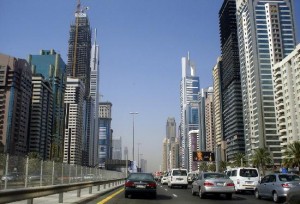Dubai’s Roads and Transport Authority (RTA) is looking at banning those on low incomes from driving in an effort to force more people onto public transport and cut congestion on the city’s busy roads, a senior official said on Wednesday.

“There are certain categories of staff that are not able to use cars because their income is very low,” Essa Abdul Rahman al-Dosari, CEO of the Public Transport Authority, told Maktoob Business in an interview.
“Why should they drive in a city where they can’t afford to?”
Dosari said a driving ban was one a number of policies under discussion to reduce congestion, which also include encouraging company carpools and creating priority bus lanes.
He would not give further details as to when the ban might come into force or which professions would be affected. However, he said wealthier professions would not be impacted.
“The wealthy, they are very few, why should we concentrate on them? Let them drive a car … we should target the majority of people,” he said.
Dubai is notorious for its long traffic jams.
Congestion has eased in the last nine months as more expatriates leave due to the economic downturn, but at its peak major highways would regularly come to a standstill during rush hour and built-up areas be gridlocked for large parts of the day.
The RTA has estimated traffic congestion costs the city’s economy around 4.6 billion dirhams ($1.25 billion) a year in lost man-hours.
Much of the congestion has been blamed on a lack of public transport.
In response the government has embarked on massive infrastructure projects. The RTA announced in 2008 it plans to spend around 52.5 billion dirhams ($14.3 billion) over the next five years building roads, bridges, a metro network, and expanding its fleet of busses and taxis.
However, critics question whether the city of car-lovers will make the switch to public transport.
Temperatures in the Gulf state can reach as high as 50 degrees Celsius in the summer months and residents will not want to spend time waiting or walking in the heat unless there is no alternative, critics say.
Dosari said the average number of people using a car in Dubai is currently 1.6. The RTA wants to increase this to at least two, he said.
The RTA in July 2007 launched the Gulf’s first road toll scheme, Salik, to try and price motorists off the city’s busy Sheikh Zayed Road, and has gradually expanded it since.
The authority has been dogged by rumours that it plans to expand the unpopular toll further, with media reports citing Emirates Road, Al Khail Road, Al Ittihad Road, Shindagha Tunnel and Business Bay Crossing all as potential locations for toll gates.
The RTA said in March a decision on further gates would be made after an assessment of the traffic situation once Dubai Metro launches in September.
Dosari said he would like to see Salik made more expensive during rush hour.
“I would like to see it (Salik) increased during peak times, but then make it free during less busy times and public holidays,” he said.
Dosari stressed the RTA would wait until there are viable alternatives to the car before implementing restrictive policies.
“We will not enforce any policy while an alternative is not available,” he said.
















